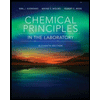When we combine two aqueous salts with the same anion: A. PRECIPITATE B. NO REACTION When we combine two aqueous salts with the same cation: A. PRECIPITATE B. NO REACTION Generally, which cations produce precipitates? Barium Calcium Sodium Potassium Silver Generally, which anions never seem to produce precipitates? chlorides sulfates carbonates nitrates
When we combine two aqueous salts with the same anion: A. PRECIPITATE B. NO REACTION When we combine two aqueous salts with the same cation: A. PRECIPITATE B. NO REACTION Generally, which cations produce precipitates? Barium Calcium Sodium Potassium Silver Generally, which anions never seem to produce precipitates? chlorides sulfates carbonates nitrates
Chapter16: Applications Of Neutralization Titrations
Section: Chapter Questions
Problem 16.40QAP
Related questions
Question
100%
Cations
Anions
Precipitate
No reaction

Transcribed Image Text:When we combine
two aqueous salts
with the same anion:
A. PRECIPITATE
B. NO REACTION
When we combine
two aqueous salts
with the same cation:
A. PRECIPITATE
B. NO REACTION
Generally, which
cations produce
precipitates?
Barium
Calcium
Sodium
Potassium
Silver
Generally, which
anions never seem to
produce precipitates?
chlorides
sulfates
carbonates
nitrates
Expert Solution
Step 1
A precipitation reaction occur when cations and anions of two solutions in aqueous medium combine to form an insoluble solid called a precipitate. This solid is insoluble in water that comes out of the solution.
Trending now
This is a popular solution!
Step by step
Solved in 2 steps

Knowledge Booster
Learn more about
Need a deep-dive on the concept behind this application? Look no further. Learn more about this topic, chemistry and related others by exploring similar questions and additional content below.Recommended textbooks for you


Chemical Principles in the Laboratory
Chemistry
ISBN:
9781305264434
Author:
Emil Slowinski, Wayne C. Wolsey, Robert Rossi
Publisher:
Brooks Cole

Chemistry: Principles and Reactions
Chemistry
ISBN:
9781305079373
Author:
William L. Masterton, Cecile N. Hurley
Publisher:
Cengage Learning


Chemical Principles in the Laboratory
Chemistry
ISBN:
9781305264434
Author:
Emil Slowinski, Wayne C. Wolsey, Robert Rossi
Publisher:
Brooks Cole

Chemistry: Principles and Reactions
Chemistry
ISBN:
9781305079373
Author:
William L. Masterton, Cecile N. Hurley
Publisher:
Cengage Learning

Principles of Modern Chemistry
Chemistry
ISBN:
9781305079113
Author:
David W. Oxtoby, H. Pat Gillis, Laurie J. Butler
Publisher:
Cengage Learning